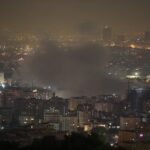Thailand has announced that talks with neighbouring Cambodia have shown signs of “progress” in resolving a protracted border dispute, which escalated into a violent confrontation last month, prompting both nations to mobilise their troops along the frontier.
On Saturday, a Thai delegation led by foreign ministry adviser Prasas Prasasvinitchai met with a Cambodian delegation headed by Lam Chea, Minister of State overseeing the Secretariat of Border Affairs, in the Cambodian capital, Phnom Penh. The discussions were aimed at defusing tensions after armed forces from the two countries exchanged fire on May 28 in the contested Emerald Triangle — a region where the borders of Thailand, Cambodia, and Laos converge — resulting in the death of a Cambodian soldier.
According to Thailand’s foreign ministry, the Joint Boundary Commission (JBC) discussions have succeeded in “building mutual understanding” between the two sides. Spokesman Nikorndej Balankura told reporters during a press briefing that “diplomatic dialogue remains the most effective way forward,” while confirming that talks would extend into Sunday. A final resolution was not anticipated over the weekend, and no timeline has been given for the announcement of any definitive outcome.
Both the Thai and Cambodian militaries have claimed self-defence in relation to the border firefight, and have since reached a mutual agreement to reposition their troops to prevent further escalations.
In the days following the incident, Thailand has tightened border security, prompting Cambodia to place its forces on “full alert.” Despite mutual pledges to resolve the conflict through diplomacy and to curb nationalist tensions, Thailand has issued warnings about potentially closing border crossings and suspending electricity supplies to Cambodia.
In response, Cambodian authorities have announced plans to halt the import of Thai electricity, internet bandwidth, and agricultural products. Additionally, Phnom Penh has directed local television broadcasters to remove Thai films from their programming.
The origins of the conflict stretch back to the colonial-era demarcation of the 820-kilometre (510-mile) land border, much of which was mapped during French colonial rule of Indo-China between 1887 and 1954. Large portions of the border remain undefined, including areas housing ancient temples that have long been points of contention. Sporadic violence in the region has persisted since 2008, resulting in at least 28 deaths to date.
Cambodian Prime Minister Hun Manet recently declared that his country would seek international arbitration by filing a case with the International Court of Justice (ICJ) over four specific disputed areas, including the site of the recent clash. Thailand, however, has expressed its preference for resolving the matter through bilateral negotiations.
In a Facebook post on Friday, Hun Manet clarified that the four disputed regions, along with the ongoing border restrictions, would not be included in Saturday’s agenda. He also confirmed that Cambodia would be submitting an official letter to the ICJ on Sunday to initiate the legal process. “Cambodia awaits Thailand to clarify its official position at [Saturday’s] meeting on whether Thailand will join Cambodia in referring the four areas to the ICJ,” Hun Manet stated.
Former Cambodian Prime Minister Hun Sen — Hun Manet’s father and an influential political figure — weighed in on the matter, levelling criticism at the Thai military. He accused elements within the Thai armed forces and nationalist circles of aggravating tensions, saying that the Thai government lacks the authority to manage its military as effectively as Cambodia can.
“Only extremist groups and some military factions are behind these issues with Cambodia because, as usual, the Thai government is unable to control its military the way our country can,” Hun Sen remarked on Thursday evening.
Although the ICJ ruled in 2013 that the land surrounding the Preah Vihear temple belonged to Cambodia, Thailand continues to dispute the court’s jurisdiction on the matter.






